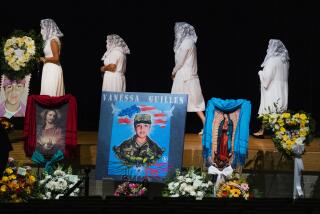2 Soldiers Face Murder Trial in Death of Panamanian : Military justice: Shooting of woman took place more than a month after the U.S. invasion. The case has been an embarrassment to the Army.
- Share via
FT. ORD, Calif. — Two U.S. soldiers who took part in last year’s invasion of Panama will be tried on murder charges here later this month in connection with the shooting of a Panamanian woman.
The shooting took place Jan. 25, more than a month after the invasion, while the soldiers were still in the country as part of a cleanup operation, military officials said. The soldiers, who are from the 7th Infantry Division at Ft. Ord, also are accused of mishandling their weapons, leaving their base without authorization and disobeying orders not to use alcohol.
Sgt. Paul Finsel Jr., 25, of Arkoma, Okla., and Pfc. Mark McMonagle, 20, of Philadelphia, face sentences of up to life imprisonment. McMonagle’s trial begins June 18, and Finsel’s trial begins June 25.
A third soldier, Pfc. Marc Gussen, 19, of Teaneck, N.J., pleaded guilty to firearms, alcohol and obstruction of justice charges at an April hearing at Ft. Ord. He was sentenced to two years in prison and a dishonorable discharge.
The case, the second prosecution of U.S. soldiers involved in the Panama invasion, has been an embarrassment to the Army, which has contended that the invasion was a highly disciplined military operation. Earlier this year, a paratrooper based at Ft. Bragg, N.C., was charged with premeditated murder in connection with the shooting of a Panamanian man who had surrendered to U.S. forces during the December invasion. Army officials are reviewing his case and trying to determine whether he should be court-martialed.
The Army has released few details about the shooting of the Panamanian woman, and military defense and prosecution attorneys refused to comment. Maj. L. D. Walker, a Ft. Ord spokesman, would say only: “The incident is alleged to have occurred when the soldiers unlawfully discharged their weapons. Shots fired by . . . McMonagle . . . allegedly resulted in the death of Leila Diaz De Panay, 50.”
The incident began, the Army charges, when the three soldiers left their barracks, against orders, to visit a bar, which also serves as a brothel. John L. Williams, a San Jose criminal attorney hired by McMonagle’s family, said that Finsel lost his Army-issue 9-millimeter pistol at the bar. When Finsel discovered the weapon missing, he became “extremely agitated,” Williams said, and decided to stage a fake firefight to cover the loss of the pistol.
The Army considers the loss of an assigned weapon “very serious,” said an Army official who asked not to be identified. “A soldier will go to great lengths to ensure that his weapon is accounted for,” he said. “And if it’s not accounted for, he’ll go to great lengths to ensure that it’s recovered.”
The three soldiers began firing their weapons in the street, Williams said, so Finsel could claim he lost his weapon during the confusion of the firefight. The result, the attorney said, was total chaos. A carload of Panamanians responded by strafing the area with automatic weapons, Williams claimed. Eventually, U.S. soldiers from the nearby temporary barracks arrived and “began sweeping the area” and shooting out street lights as a precaution.
As the Americans withdrew, an officer ordered McMonagle and a few other soldiers to “cover the rear,” Williams said.
“Soldiers were firing their M-16s . . . tracer rounds were going off,” Williams said. “It was noisy, dark and very confusing. At some point McMonagle became separated from the group. He saw a shadow and yelled: ‘Halt!’ The individual didn’t halt and McMonagle fired.”
The woman’s body was found near McMonagle but, Williams said, “others were shooting at the time and it’s not clear McMonagle shot the woman.” The Army, however, charged both McMonagle and Finsel with murder.
“This may be a lot of things, but it’s not a murder case,” Williams said. “This was clearly an accidental death. . . . It could be manslaughter, assuming the Army can prove McMonagle fired the rounds that killed the woman. The facts just don’t fit a murder charge.”
But, according to the Code of Military Justice, the Army can charge a soldier with murder even if there is no premeditation, said Walker of Ft. Ord. One of the Army’s definitions of murder includes participating in an “act inherently dangerous to others” that results in a death, he said. Although both soldiers are charged with murder, Walker said, “a lesser penalty can be determined by the court.”
McMonagle faces an additional charge of violating orders not to have “sexual contact with Panamanian females,” and Finsel faces charges of loss of military property for losing the pistol.
McMonagle joined the Army after he graduated from high school in Philadelphia so he could eventually pay for college, said his sister, Christine McMonagle. He was a high school soccer star and a good student who had “never been in any trouble before this,” she said.
“The whole thing has been a nightmare for our family,” she said. “We asked the Army legal people for an investigator to look into some inconsistencies in the case and we were turned down. The whole investigation has been very puzzling.”
The families of Finsel and Gussen were unavailable for comment.
The Army will pay compensation--the amount not yet determined--to family members of the Panamanian woman who was killed, an Army spokesman said. But the U.S. government is not planning to pay any indemnity for those killed or wounded during the invasion. According to unofficial reports, an estimated 300 Panamanians were killed and another 2,000 wounded--most of them civilians--during the invasion.
More to Read
Sign up for Essential California
The most important California stories and recommendations in your inbox every morning.
You may occasionally receive promotional content from the Los Angeles Times.










